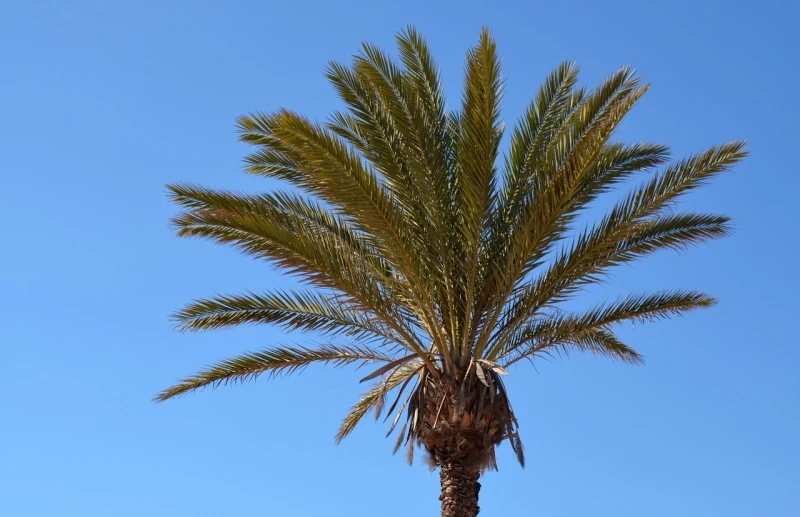Are you curious about the meaning of palm trees? Do you wonder what kind of symbolism this iconic tree holds? Look no further, as we explore the significance and meaning of palm trees in various cultures, religions, and contexts.

What is the Meaning of Palm Trees?
The palm tree is a tropical plant that is native to warm regions such as Africa, Asia, and the Americas. It has been cultivated for thousands of years and has played a significant role in numerous cultures.

Historical Significance of Palm Trees
Palm trees have played a significant role in many cultures throughout history, symbolizing victory, triumph, and prosperity. In ancient Greek and Roman times, palm trees were highly valued for their beauty and resilience, and they were often used to decorate public spaces, temples, and private gardens. At sporting events, victorious athletes would be adorned with palm wreaths as a sign of their success.
Moreover, the symbolism of palm trees extends beyond Western culture. In the Middle East, palm trees have been cultivated for thousands of years, providing food, shelter, and shade to people living in the harsh desert environment. They are also mentioned frequently in the Bible and Quran, where they represent fertility, abundance, and righteousness.
In Jewish tradition, palm branches have a special significance during the festival of Sukkot. During this harvest festival, which takes place in the fall, Jews construct temporary outdoor dwellings called sukkahs and decorate them with palm branches, fruit, and other symbols of the harvest. This custom is meant to recall the Israelites’ journey through the wilderness after their liberation from Egypt and their eventual arrival in the Promised Land.
In addition to their cultural and religious significance, palm trees have also played an important economic role throughout history. The fruit of the date palm, in particular, has been a staple food for people in the Middle East and North Africa for thousands of years, providing a source of nutrition and sustenance in areas with limited resources. Today, palm trees continue to be cultivated around the world for their fruit, oil, and other useful products.
Spiritual Significance of Palm Trees
Palm trees have held spiritual significance in various cultures and religions throughout history. Their significance can be attributed to their unique qualities and characteristics that resonate with spiritual beliefs and practices.
In Hinduism, the coconut palm is considered a sacred tree and holds great significance as a symbol of fertility and prosperity. The coconut is used in various rituals and offerings to deities, and the tree is believed to represent the divine feminine energy. In addition, the presence of a coconut tree in a household is believed to bring good luck, prosperity, and protection from negative energies.
In Christianity, palm branches are associated with the celebration of Palm Sunday, which commemorates Jesus Christ’s entry into Jerusalem. According to the Bible, people spread palm branches and cloaks on the road ahead of Jesus as a sign of honor and respect. Hence, palm branches have become a symbol of victory, triumph, and peace in the Christian faith.
Similarly, in Islam, palm trees hold great spiritual significance and are mentioned several times in the Quran. They are seen as a symbol of paradise and are believed to grow abundantly in heaven. In fact, one of the names of paradise in Islamic tradition is “Jannah al-Nakhil,” which means “the Garden of Palm Trees.”
Apart from their symbolic associations, palm trees also possess physical properties that make them significant in spiritual practices. For instance, they are known for their resilience and ability to adapt to different environments, which can symbolize strength, perseverance, and flexibility. Moreover, the palm tree’s trunk, leaves, and fruit have been used in various healing practices and medicines, further emphasizing their importance in promoting spiritual well-being.
In conclusion, palm trees hold spiritual significance in many cultures and religions, representing various themes such as prosperity, victory, paradise, and resilience. Their unique qualities and symbolic associations make them valuable symbols in spiritual practices and beliefs, inspiring people to connect with their inner selves and pursue transcendent ideals.
Symbolism of Palm Trees in Modern Society
The symbolism of palm trees in modern society extends beyond their association with tropical getaways. These tall, slender trees have come to represent a variety of values and ideas that are highly valued in contemporary culture. One of the most prominent of these is the concept of luxury.
The image of palm trees swaying gently in the warm breeze has become synonymous with upscale resorts and high-end vacations. This is due in part to the fact that palm trees are native to many of the world’s most popular vacation destinations, including the Caribbean, Hawaii, and parts of Asia. As a result, they have become closely associated with the idea of travel and leisure.
Beyond their association with luxury, palm trees also represent resilience and perseverance. These trees are able to survive in harsh conditions, such as drought and extreme temperatures, thanks to their deep root system and ability to store water. As such, they have become a symbol of endurance and determination, qualities that are highly valued in today’s fast-paced, competitive society.
In addition to their association with luxury and resilience, palm trees are also seen as a symbol of growth and transformation. The palm tree’s tall, slender trunk represents an upward journey towards success, while its branches and leaves suggest a sense of expansion and abundance. As such, palm trees are often used in branding and marketing campaigns to evoke feelings of progress and prosperity.
Of course, the symbolism of palm trees is not limited to their association with travel, resilience, and growth. Depending on the context, they can also represent other values and ideas, such as relaxation, tranquility, and even spirituality. Whether they are featured in advertisements or used as a decorative element in home decor, palm trees have become an enduring symbol of modern society, representing a wide range of ideals and aspirations.
What Does a Palm Tree Symbolize?
Palm trees hold various meanings and symbolism depending on the context and culture they are viewed in. Here are some common interpretations of palm trees:
Fertility and Immortality
Palm trees, apart from their physical beauty and practical uses, hold significant cultural and symbolic meanings throughout history. In various ancient civilizations, palm trees were believed to represent fertility, immortality, and even divine protection.
In ancient Egyptian mythology, the palm tree was revered as the “Tree of Life” and stood as a symbol of resurrection and eternal life. The goddess Hathor was also associated with the palm tree, and it was believed that she embodied the power of fertility and childbirth. Due to its association with fertility and life-giving properties, palm branches were commonly used in religious ceremonies and funerals.
In Hinduism, the coconut palm is considered a sacred symbol of fertility and prosperity. It is regarded as a gift from the gods due to its nourishing benefits and versatility. Coconut water, milk, and oil are used in various rituals, prayers, and offerings. Additionally, the leaves of the palm tree are used to make garlands and decorations for auspicious occasions such as weddings.
Moreover, palm trees are often associated with tropical paradise locations, and their appearance in artwork, movies, and literature evokes an image of relaxation, luxury, and escape. Whether standing tall on secluded islands or lining bustling city streets, palm trees continue to hold a special place in our hearts and imaginations.
Resilience and Tenacity
The palm tree symbolizes resilience and tenacity due to its remarkable ability to withstand harsh weather conditions such as hurricanes and droughts. These trees have adapted over time to survive in some of the most challenging environments on earth, from arid deserts to tropical islands.
Their strong roots enable them to anchor themselves firmly in the ground, giving them stability and strength to withstand strong winds and storms. Even when their leaves are stripped away by hurricane-force winds, they can still recover and regrow new leaves.
In addition to their physical resilience, palm trees also represent a metaphorical resilience that can inspire individuals facing adversity. They serve as a reminder that even in the face of hardship and challenges, it is possible to stay rooted and steadfast, and emerge stronger and more resilient than before.
Moreover, palm trees have cultural and historical significance in many parts of the world. In ancient times, they were considered sacred and revered as symbols of victory, peace, and prosperity. Their fruits, like dates and coconuts, provided nourishment and sustenance for communities living in arid regions.
Overall, the palm tree symbolizes resilience, tenacity, and adaptability, making it a powerful source of inspiration for individuals facing difficult circumstances.
Victory and Triumph
Throughout history, palm trees have been seen as a symbol of victory and triumph. This association can be traced back to ancient times when the palm tree was commonly used as a symbol of triumph in various cultures.
In ancient Greece, for example, palm leaves were awarded to victorious athletes at sporting events such as the Olympic Games. Similarly, in ancient Rome, palm branches were given to successful military commanders as a sign of victory. In both cases, the palm tree became associated with achievement, success, and accomplishment.
Today, the palm tree is still used as a symbol of triumph and celebration. It is often depicted on flags, logos, and emblems to represent victory or achievement. In some cultures, the palm tree is also associated with good luck, abundance, and prosperity.
In addition to its symbolic meaning, the palm tree has practical uses as well. Its fruit, such as dates and coconuts, has long been used as a source of food and nourishment. The leaves and fiber of the palm tree can also be used to make various products, including baskets, ropes, and mats.
Overall, the palm tree symbolizes a sense of accomplishment, success, and victory. It serves as a reminder that hard work and perseverance can lead to great achievements. Whether used in an emblematic sense or in real-life applications, the palm tree remains a powerful and meaningful symbol.
Relaxation and Tranquility
The palm tree is a symbol often associated with relaxation, tranquility, and vacation. This tropical tree is often depicted in art, literature, and media as a representation of paradise, calmness, and serenity.
One reason for the palm tree’s association with relaxation is its physical characteristics. The long, slender trunk of the palm tree allows it to sway gently in the breeze, creating a soothing sound as the leaves rustle together. This gentle motion and calming sound can have a relaxing effect on the mind and body, helping to reduce stress and anxiety.
In addition to its physical characteristics, the palm tree is also closely linked with tropical environments and warm climates, where relaxation and leisure activities are often associated. The image of a palm tree on a beach or near a pool can evoke feelings of rest and rejuvenation, making it a popular symbol for vacation destinations and travel advertisements.
Furthermore, the palm tree has cultural significance in many parts of the world. In some cultures, it is seen as a symbol of victory and triumph, while in others it represents protection and shelter. Its long history of human use also means that it has been associated with many different meanings over time.
Overall, whether viewed through its physical characteristics, cultural significance, or societal associations, the palm tree remains an enduring symbol of relaxation and tranquility.
Longevity and Wisdom
Palm trees have been revered across different cultures and geographies for centuries, thanks to their unique physical characteristics and longevity. These trees can live for many decades, often even centuries, and this is one of the reasons why they have come to represent wisdom, longevity, and resilience.
In addition to their impressive lifespan, palm trees are also known for their ability to weather harsh climates and extreme weather conditions. In arid regions where other types of trees might wither away, palm trees continue to thrive, reminding us of the importance of perseverance and persistence. This resilience is another factor that reinforces the symbolic meaning of palm trees as a representation of strength and endurance.
Beyond their practical uses, such as providing food, shade, and building materials, palm trees have also acquired a special place in cultural symbolism. For example, in some cultures, the palm tree is seen as a symbol of aging gracefully, with its tall and slender trunk, graceful fronds, and dignified presence embodying the idea of growing older with grace and dignity.
Moreover, palm trees have also been associated with paradise and exoticism, conjuring up images of tropical paradises and idyllic beaches. This association has further added to the mystique and allure surrounding these trees, making them a popular motif in art, literature, and design.
Overall, the palm tree symbolizes many things – from resilience and endurance to wisdom and exoticism – depending on the context and culture in which it is used. Nevertheless, its enduring popularity and widespread use across different societies and geographies testify to its enduring appeal and timeless significance.
Conclusion
Palm trees hold significant meaning and symbolism in various cultures and contexts, from ancient times to modern society. They represent resilience, victory, relaxation, longevity, and wisdom. Whether you admire them for their beauty or appreciate their cultural heritage, palm trees are a valuable and iconic part of our world.

Hey there! I am Salena Snyde, a dream psychologist with over 10 years of experience. I am the primary author of the Dream Meanings section on Impeccable Nest, where I not only share in-depth knowledge about the nature, function, and significance of dreams but also connect with readers through profound articles and quality information. With passion and a diverse knowledge of dreams, I have established strong connections with dream experts worldwide by reading articles and studying leading books on the subject. I believe that the combination of personal insights and sharing from the dream expert community can provide the most profound and comprehensive understanding for everyone.
